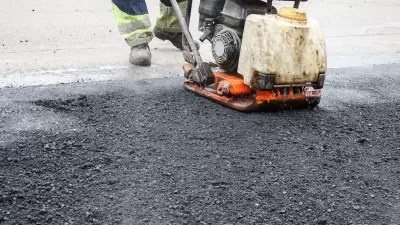A decision from the Government Accountability Office spurred by Republican pushback led the agency to issue a new memo abandoning its previous stance, which ‘gently’ promoted maintenance work over new road construction.

Under pressure from Republican lawmakers, the U.S. Department of Transportation (USDOT) is walking back its effort to promote road maintenance and multimodal infrastructure over new highway construction, reports Alex Daugherty in Politico.
Daugherty explains that “The Federal Highway Administration issued a new policy memo on Friday that rescinds previous language it had sent to states in December, which had urged them to use money from the 2021 infrastructure law on ‘fix it first’ programs.” Now, states can spend federal infrastructure funding however they want, with no guidance encouraging investment in pedestrian and bike infrastructure or transit.
Although the language in the 2021 memo was nonbinding, “the Government Accountability Office determined that the document went beyond listing legal requirements and instead expressed a policy preference.” The new memo prioritizes states’ rights, stating, “FHWA recognizes and values the authority and role of the States in deciding how to prioritize the use of their Federal-aid highway dollars and will continue to administer funds and programs consistent with all requisite statutory requirements and considerations.”
FULL STORY: After Republican complaints, DOT abandons attempt to discourage highway construction

Planetizen Federal Action Tracker
A weekly monitor of how Trump’s orders and actions are impacting planners and planning in America.

Chicago’s Ghost Rails
Just beneath the surface of the modern city lie the remnants of its expansive early 20th-century streetcar system.

San Antonio and Austin are Fusing Into one Massive Megaregion
The region spanning the two central Texas cities is growing fast, posing challenges for local infrastructure and water supplies.

Since Zion's Shuttles Went Electric “The Smog is Gone”
Visitors to Zion National Park can enjoy the canyon via the nation’s first fully electric park shuttle system.

Trump Distributing DOT Safety Funds at 1/10 Rate of Biden
Funds for Safe Streets and other transportation safety and equity programs are being held up by administrative reviews and conflicts with the Trump administration’s priorities.

German Cities Subsidize Taxis for Women Amid Wave of Violence
Free or low-cost taxi rides can help women navigate cities more safely, but critics say the programs don't address the root causes of violence against women.
Urban Design for Planners 1: Software Tools
This six-course series explores essential urban design concepts using open source software and equips planners with the tools they need to participate fully in the urban design process.
Planning for Universal Design
Learn the tools for implementing Universal Design in planning regulations.
planning NEXT
Appalachian Highlands Housing Partners
Mpact (founded as Rail~Volution)
City of Camden Redevelopment Agency
City of Astoria
City of Portland
City of Laramie





























